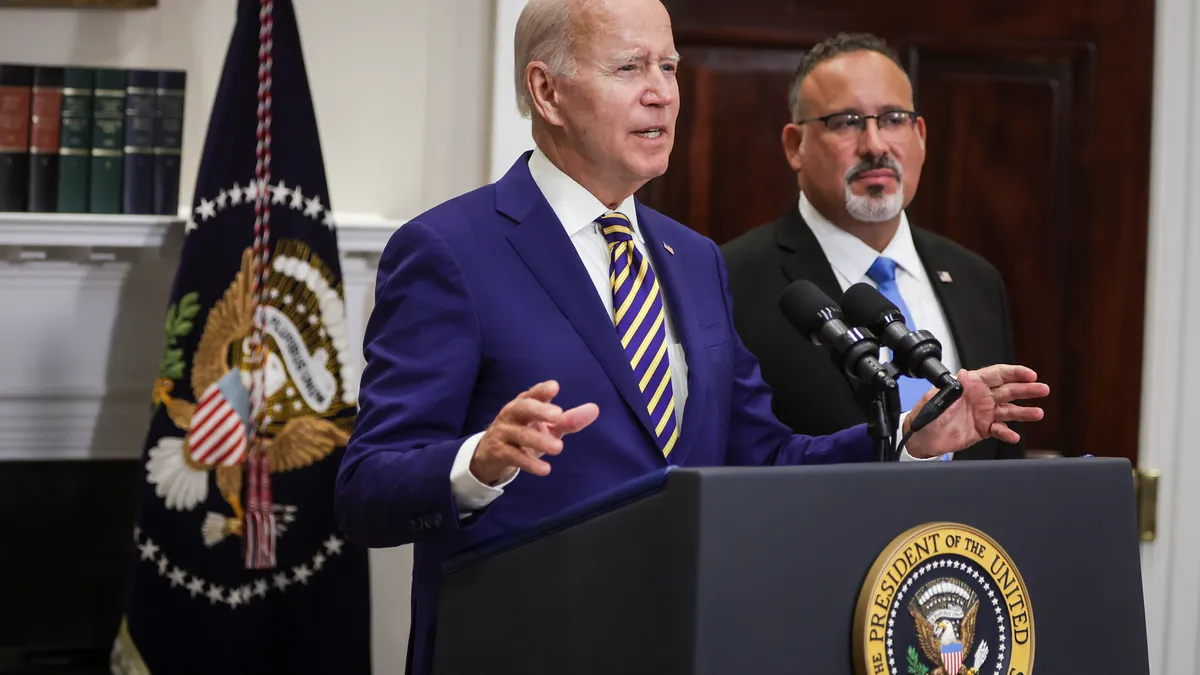Dive Brief:
- Six states sued the Biden administration Thursday in a Missouri federal court in an attempt to stop a wide-ranging student loan cancellation plan the president announced last month.
- President Joe Biden's plan infringes on powers the Constitution gives Congress and skirts proper regulatory procedures, the lawsuit argues. It was filed by Republican attorneys general from Arkansas, Kansas, Missouri, Nebraska and South Carolina, as well as Iowa’s solicitor general.
- The states are asking the court for an immediate restraining order to stop debt forgiveness from going forward. That's necessary because the Biden administration signaled it could start forgiving debt as soon as next week, the lawsuit says.
Dive Insight:
Biden's plan would forgive up to $10,000 in student loan debt for individuals who earn as much as $125,000 per year, or $20,000 for borrowers who received federal Pell Grants when they were in college. It's estimated to cost some $400 billion over 30 years, and 95% of the country's 40 million-plus student loan borrowers are expected to meet its income requirements.
Thursday's lawsuit is not the first legal effort to stop the Biden administration from forgiving student loans — a libertarian group sued Tuesday, alleging officials overstepped their authority and violated the Constitution.
But Thursday's effort is still an escalation for Republicans, who have been slamming loan forgiveness — and U.S. higher education's costs — since Biden announced the policy.
“President Biden’s unlawful political play puts the self-wrought college-loan debt on the backs of millions of hardworking Americans who are struggling to pay their utility bills and home loans in the midst of Biden’s inflation,” Arkansas Attorney General Leslie Rutledge said in a statement. “President Biden does not have the power to arbitrarily erase the college debt of adults who chose to take out those loans.”
The lawsuit is also notable for showing just how far the financial and political ramifications of student debt reach. The states make the case that their finances, and in some cases the finances of public colleges, are directly harmed if student loan borrowers have their debts cleared.
The lawsuit points to public agencies like the Higher Education Loan Authority of the State of Missouri, which hold and service student loans. Such agencies will be harmed when they lose federal loans as assets because of the forgiveness, the lawsuit says. They would also have to assume compliance costs to conform to the new policy.
Elsewhere, Nebraska uses returns from investments involving student loans to benefit pensioners, the lawsuit says.
Other states will suffer "direct pocketbook harms" because the forgiveness policy will accelerate some loan discharges, the lawsuit alleges.
Loan discharges that would have taken place far in the future will now take place over the next five years. That harms states because federal coronavirus relief law bars debt forgiveness from being taxed until 2026, according to the lawsuit.
Several states normally tax student loan discharges.
"The Mass Debt Cancellation, however, will reduce that tax revenue by decreasing the amount of outstanding student loan debt," the lawsuit says. "As a result, the Mass Debt Cancellation costs Nebraska, Iowa, Kansas, and South Carolina tax revenue."
Biden's administration justified loan forgiveness with the 2003 Higher Education Relief Opportunities for Students, or HEROES, Act. That law gives the education secretary the ability to change federal financial aid programs due to war, military operations or national emergencies. The administration said the coronavirus pandemic qualifies as such an emergency.
But the lawsuit argues several pandemic-era modifications to the student loan system, such as a multiyear suspension on repayment requirements and interest, left most borrowers in a better position today than they were in before the pandemic.
"The Mass Debt Cancellation instead disregards the Act’s objectives and express requirements and distorts the Act beyond recognition in the service of the Administration’s political agenda on student loans," the lawsuit says. "It is the epitome of unlawful and arbitrary agency action, and it should be set aside."
No law allows the president to unilaterally clear loans people voluntarily took out when they were students, the lawsuit argues.
The White House did not immediately respond to a request for comment.
The Biden administration has signaled that it's weighing the legality of parts of its debt forgiveness plan. It initially said the plan would cover borrowers whose federal student loans are owned by private companies. But on Thursday officials changed course, dropping forgiveness for private loans amid worries companies could take it to court, Politico reported.














